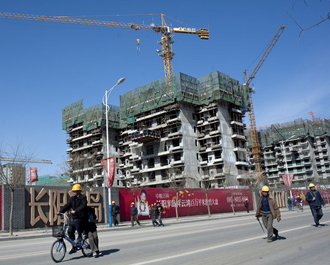China’s real-estate market is showing signs of a revival, at least in the top cities of Shanghai and Beijing. However, other signs suggest prices aren’t likely to recover across China for some time to come.
Average home prices ended nine months of declines with a 0.05% rise in June to 8,688 yuan ($1,375) per square meter, according to the China Real Estate index system, according to China’s Time Weekly magazine.
Signs of a recovery were more robust in Shanghai where home sales increased 30.7% in total area, and 11% in terms of value, according to private realty monitors. In Beijing the number of apartments sold rose 10.5% in June over May or a hefty 50.6% surge over the same month of 2011.
Prices are also recovering, at least in these cities. Beijing’s new home prices rose 2.2% in June over the same month of 2011, up slightly from a 2.1% rise in May, according to China’s statistics bureau. In Shanghai prices rose 2.2%, up from 1.4% growth in May.
These increase are especially noteworthy in light of a statement by Premier Wen Jiabao July 7 that the central government wasn’t easing up on its policy of containing housing prices. His statement reinforced those made earlier by four major offices — the Banking Regulatory Commission, the central bank, the Ministry of Housing and Urban-Rural Development, and the National Development and Reform Commission.
Home prices are more likely to decline than to recover because as of the end of May the 13 leading cities in China have an unsold inventory of 780,000 houses representing a 29.6% jump over the same period last year, Time Weekly quoted Huang Tao, a manager with major real estate firm Centaline Property. At best the real estate market is stabilizing, said Huang.
In the first five months of this year real estate developers bought 18.7% less raw land than the same period last year, and the total size of houses under construction decreased 4.3%, said Zhang Hongwei, the head of realty consultancy Tospur.
“All these indicate a weak market,” he told Time Weekly.


